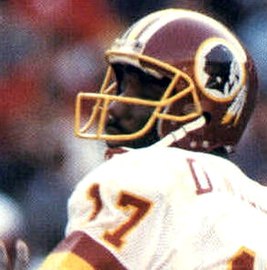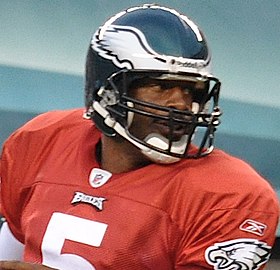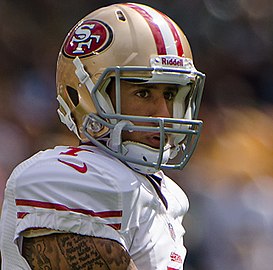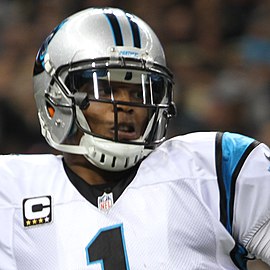List of black starting NFL quarterbacks

This list of black starting NFL quarterbacks includes those who have started in a regular-season or post-season game in the National Football League (NFL). The quarterback is the leader of a team's offense, directing other players on the field.[1][2] Some authors have contended that black players have been excluded from playing quarterback in the NFL because of the belief that white players would not follow their leadership and the perception that black quarterbacks lack intelligence, dependability, composure, character, or charisma.[3][4] Promising black quarterbacks at the high school and college levels were often transitioned at the professional level to other positions, such as running back or wide receiver.[5][6][7] While a ban on black players in the NFL ended in 1946,[1] the quarterback position was among the last to be desegregated.[2]
Although black quarterbacks and other quarterbacks of color vary in physical size and playing style,[8] racial stereotyping persists.[9][10] A 2015 study found that even when controlling for various factors, black quarterbacks are twice as likely to be "benched", or removed from play, as white quarterbacks.[11] Other studies have found that sports broadcasters are more likely to attribute a black quarterback's success to superior athletic attributes and a white quarterback's success to superior intellect.[12][13] It was not until 2017, when the New York Giants started Geno Smith in place of the benched Eli Manning,[14] that all 32 active NFL teams had started at least one black quarterback.[15] That year, nearly 70% of NFL players, but only 25% of starting quarterbacks, were black.[6] 15 of the league's 32 starting quarterbacks were black at the start of the 2024 NFL season, the most in a single week in NFL history.[16]
Pre-Super Bowl era
Racial antagonism should have no place in football, but unhappily the millennium has not yet arrived. Unscrupulous opponents did their best to knock Brown's gritty colored star cold. They were out to 'get' Pollard and they weren't too particular with how they got him. No white man would have had to take the punishment Pollard did.
The quarterback position has changed over the years and did not exist in its modern form in the early 20th century. In the early days of football, quarterbacks were called upon to throw the ball, run the ball, and kick the ball; the forward pass was not adopted widely until the 1930s. However, tailbacks who played in the single-wing formation are "the equivalent of a modern-day quarterback"[18] or "the closest thing to it."[1]


Single-wing tailback Fritz Pollard, a key figure in the early days of the NFL, became the league's first black quarterback when he started playing the position for the Hammond Pros in 1923.[1] By that time, he had already become the first black head coach in the NFL, and prior to his professional career, the first black quarterback All-American and the first to appear in the Rose Bowl. Pollard faced racism throughout his career, including from his teammates. In college, fans were reported to sing "Bye Bye Blackbird" when he took the field. Pollard would sometimes have to enter the field through a separate gate, or be driven onto the field in a car for his own safety, in order to avoid fans who chanted "kill the nigger" and threw bottles and bricks at him. After retiring from football, Pollard started the first black tabloid newspaper, the New York Independent News.[20] In 2005, Pollard was inducted into the Pro Football Hall of Fame.[1][21]
The demise of the competing American Football League (AFL) in the 1920s left a "glut of available white players eager to sign on with the NFL, rendering black players expendable."[1] In 1926, there were five black players in the NFL, in 1927 only one. With the onset of the Great Depression in the 1930s, economic pressures led to a further deterioration of race relations, and minorities were often vilified and scapegoated. When the Chicago Cardinals signed Joe Lillard in 1932, the same year a rule change expanded the forward pass and Franklin Delano Roosevelt won the US presidency with 75% of the black vote, he was the NFL's only black player at the time. Lillard started 12 games with the Chicago Cardinals, and although he threw passes, ran the ball, kicked the ball, and returned punts, he was used sparingly as a quarterback.[1][22]
1932 was also the year that segregationist George Preston Marshall founded the Boston Braves. The following year, Marshall renamed the Braves the Boston Redskins and brokered an NFL-wide ban on black players. Joe Lillard was released, and by 1934, there were no black players with NFL contracts. In 1937, Marshall moved the Redskins to the southern city of Washington D.C., which was still segregated, renaming the team the Washington Redskins. Marshall's so-called "gentlemen's agreement" barring black players from the NFL lasted until after World War II, when the All-America Football Conference (AAFC) launched in 1946 as an unsegregated competing league. NFL owners relented and lifted the ban, although Marshall nevertheless refused to sign any black players to the Redskins until 1962, when he finally relented under threat from President John F. Kennedy to cancel the Redskins' 30-year stadium lease unless they integrated.[1]

In 1949, George Taliaferro became the first black player drafted into the NFL. Taliaferro had previously played college football for the Indiana Hoosiers. He missed the 1946 season when he was conscripted into the US Army but returned to lead the Hoosiers in both rushing and passing in 1948. The NFL's Chicago Bears drafted Taliaferro in 1949, but he had already signed a contract with the Los Angeles Dons in the AAFC. The LA Dons later joined the NFL, and Taliaferro along with them. He played an unprecedented seven positions during his career, including single-wing tailback or quarterback, more than any player in NFL history. Taliaferro retired in 1955.[1][18][23]
Two other black quarterbacks made brief appearances in the pre-Super Bowl NFL. Willie Thrower, "the first black NFL quarterback of the modern mold", played for Michigan State in college before playing one professional game at quarterback for the Bears, in relief duty, on October 18, 1953. Charlie Brackins, the NFL's first black quarterback to have graduated from a historically Black college or university (HBCU), played one game as quarterback for the Green Bay Packers in 1955, missed both of his pass attempts, and was released by the team before the next game.[1]
| Years active | Quarterback | Team |
|---|---|---|
| 1920–1926 | Fritz Pollard | Akron Pros, Milwaukee Badgers, Hammond Pros, Providence Steam Rollers, Akron Indians |
| 1932–1933 | Joe Lillard | Chicago Cardinals |
| 1950–1955 | George Taliaferro | New York Yanks, Dallas Texans, Baltimore Colts, Philadelphia Eagles |
| 1953 | Willie Thrower | Chicago Bears |
| 1955 | Charlie Brackins | Green Bay Packers |
| Source: Howard 2014 | ||
First by team (Super Bowl era)
Of the dozens of quarterbacks on the rosters of the 26 major league professional teams in the United States, Marlin is the only one whose skin is black ... But Marlin is not mainly interested in proving he can run the ball. What he's trying to show them is that a black man can run the ball club.
In 1967, the American Football League agreed to merge with the NFL, becoming the American Football Conference, with most former NFL teams forming the National Football Conference. Although the first championship game between the two conferences, known as the Super Bowl, was held in 1967, the merger was not completed until 1970. Marlin Briscoe played for the Denver Broncos, an AFL team, in 1968, and is considered the first black quarterback to start a game in the modern NFL. Briscoe started his rookie year as a defensive back, but when the starting quarterback was injured, Briscoe was called to fill in. He started the last five games of the season, during which he threw 14 touchdown passes and was a candidate for Rookie of the Year. Nevertheless, he was released after the season, and later converted to a receiver.[1][15][22]
NFL MVPs
Four black quarterbacks have won the NFL MVP award a total of six times. Patrick Mahomes was the first to win it multiple times, with Lamar Jackson being the second.
| Season | Player | Team |
|---|---|---|
| 2003 | Steve McNair | Tennessee Titans |
| 2015 | Cam Newton | Carolina Panthers |
| 2018 | Patrick Mahomes | Kansas City Chiefs |
| 2019 | Lamar Jackson | Baltimore Ravens |
| 2022 | Patrick Mahomes | Kansas City Chiefs |
| 2023 | Lamar Jackson | Baltimore Ravens |
Playoff starters
In 1974, James Harris became the first black quarterback to start and win an NFL playoff game.[4][8] Midway through the 1976 season, Harris was benched by his team's owner, Carroll Rosenbloom, who explained his decision by telling the press, "Unfortunately, the quarterback position is controversial enough without adding the color element."[2] After retiring, Harris became an executive for four teams and earned a Super Bowl ring in 2000 with the Baltimore Ravens.[2]
Warren Moon, who made seven playoff appearances, was the first black quarterback elected to the Pro Football Hall of Fame.[3] During his NFL career (1984–2000), he was the first black quarterback on four different teams.[1][22]
The 2023–2024 playoffs featured six starting black quarterbacks, the most in NFL history.[25][f]
- James Harris[8]
- Randall Cunningham[26]
- Daunte Culpepper[26]
- Aaron Brooks[26]
- Steve McNair[26]
- Quincy Carter[26]
- Doug Williams[26]
- Kordell Stewart[26]
- Warren Moon[26]
- Shaun King[26]
- Michael Vick[26]
- David Garrard[26]
- Donovan McNabb[26]
- Cam Newton[26]
- Robert Griffin III[1]
- Russell Wilson[26]
- Colin Kaepernick[26]
- Teddy Bridgewater[26]
- Dak Prescott[26]
- Tyrod Taylor[7]
- Deshaun Watson[4]
- Lamar Jackson[4]
- Patrick Mahomes[4]
- Jalen Hurts[25]
- C. J. Stroud[25]
- Jordan Love[25]
Most playoff wins
| Player | Team(s) | Wins |
|---|---|---|
| Patrick Mahomes | Kansas City Chiefs | 15 |
| Russell Wilson* | Seattle Seahawks | 9 |
| Donovan McNabb* | Philadelphia Eagles | 9 |
| Steve McNair* | Tennessee Titans | 5 |
| Kordell Stewart* | Pittsburgh Steelers | 5 |
*Indicates a quarterback who played for other teams but did not win a playoff game for them.
Super Bowl starters
In 1982, a players' strike cut the NFL season short to nine games. When a second strike occurred in 1987, the NFL, not wanting to lose games, hired replacement players. That year, black quarterbacks in the league tripled in number.[1]
On September 20, 1987, Doug Williams became the first black quarterback to start a game for the Washington Redskins, the team that had been segregated for so long by its former owner, George Preston Marshall.[27][28] Before starting for Washington, Williams had been drafted by the Tampa Bay Buccaneers and led them to three playoff appearances in three years.[1] Williams joined the Redskins in the 1986 season, when he threw only one pass (incomplete). He played backup for most of the 1987 season, but outperformed the first-string quarterback, and was made starting quarterback for the playoffs.[1] On January 31, 1988, he became the first black quarterback to start in the Super Bowl, and a few hours later, the first to win it, ironically wearing the Super Bowl ring of the last team in the league to integrate black players.[29] Williams threw for 340 yards and four touchdowns–Super Bowl records at the time–and was named Super Bowl MVP.[4][30] He was benched the next season and retired shortly thereafter.[1]
Kansas City Chiefs quarterback Patrick Mahomes was the seventh black quarterback to start a Super Bowl.[31] The combined Super Bowl records of black quarterbacks is 5–7. Williams and Mahomes are to date the only players to win the Super Bowl MVP award.[32] Only Mahomes and Seattle Seahawks quarterback Russell Wilson have started multiple Super Bowls. Both players won their first Super Bowl appearance, but lost their second. In 2023, Mahomes became the first to start three Super Bowls.[31] With the Chiefs' win, Mahomes became the first black quarterback to win two Super Bowls, as well as to win two MVP awards. The following year, he became the first black quarterback to repeat as Super Bowl champion.
Super Bowl LVII also marked the first time that both Super Bowl starting quarterbacks were black: Patrick Mahomes started for the Kansas City Chiefs, while Jalen Hurts started for the Philadelphia Eagles.[31][33] The Eagles are the first team to have two different black starting quarterbacks start a Super Bowl.
| Quarterback | Result/Super Bowl | Team |
|---|---|---|
| Doug Williams | Won Super Bowl XXII (MVP) | Washington Redskins |
| Steve McNair | Lost Super Bowl XXXIV | Tennessee Titans |
| Donovan McNabb | Lost Super Bowl XXXIX | Philadelphia Eagles |
| Colin Kaepernick | Lost Super Bowl XLVII | San Francisco 49ers |
| Russell Wilson | Won Super Bowl XLVIII Lost Super Bowl XLIX |
Seattle Seahawks |
| Cam Newton | Lost Super Bowl 50 | Carolina Panthers |
| Patrick Mahomes | Won Super Bowl LIV (MVP) Lost Super Bowl LV Won Super Bowl LVII (MVP) Won Super Bowl LVIII (MVP) |
Kansas City Chiefs |
| Jalen Hurts | Lost Super Bowl LVII | Philadelphia Eagles |
- Gallery
Full list
In 2000, Doug Williams, Warren Moon, Marlin Briscoe and James Harris formed the Field Generals, a fraternity for black quarterbacks.[8]
See also
Notes
- ^ Briscoe added, "The black player may have to go through some things ... But I'm talking about the average player, not my particular case. On this team, I didn't have that problem. There wasn't any racial problem."[24]
- ^ The Chargers were based in San Diego, California at the time.
- ^ The Titans were based in Houston, Texas at the time, playing as the Houston Oilers.
- ^ The team was played as the Redskins at the time.
- ^ The Raiders were based in Los Angeles, California at the time.
- ^ The six quarterbacks were Jalen Hurts (Philadelphia Eagles), Lamar Jackson (Baltimore Ravens), Jordan Love (Green Bay Packers), Patrick Mahomes (Kansas City Chiefs), Dak Prescott (Dallas Cowboys), and C. J. Stroud (Houston Texans).[25]
References
- ^ a b c d e f g h i j k l m n o p q r s t u v w x y z aa ab ac ad ae af ag ah ai aj ak al am an ao ap aq ar as at au av aw ax ay az ba bb bc bd be bf bg bh bi bj bk bl bm bn bo bp bq br bs bt bu Howard, Greg (2014-02-06). "The Big Book Of Black Quarterbacks". Deadspin. Archived from the original on 2019-03-04. Retrieved 2019-03-10.
- ^ a b c d Freedman, Samuel G. (2018-02-02). "Perspective | The quarterback who paved the way for Colin Kaepernick's protests". Washington Post. Archived from the original on 2019-02-14. Retrieved 2019-03-15.
- ^ a b Johnson, Martenzie (2018-09-24). "Deshaun Watson and the intellect of black quarterbacks". Andscape. Retrieved 2019-03-16.
- ^ a b c d e f Ramsey, Timothy (2019-01-10). "The evolution of the black quarterback in the NFL". Winston-Salem Chronicle. Retrieved 2019-03-18.
- ^ "28 QBs who converted to WR: Not Lamar Jackson comps - Banner Society". 27 April 2017.
- ^ a b Kimes, Mina (2017-11-02). "The great Tyrod Taylor debate". ESPN. Archived from the original on 2017-11-08. Retrieved 2019-03-15.
- ^ a b Brill, Lauren (2018-08-01). "This is life as a black NFL QB in 2018". WEWS News 5 (ABC affiliate). Retrieved 2019-03-18.
- ^ a b c d Rhoden, William C. (2019-01-11). "The thriving fraternity of black quarterbacks". Andscape. Retrieved 2019-03-16.
- ^ Ferrucci, Patrick; Tandoc, Edson C. (2018-04-03). "The Spiral of Stereotyping: Social Identity Theory and NFL Quarterbacks". Howard Journal of Communications. 29 (2): 107–125. doi:10.1080/10646175.2017.1315693. ISSN 1064-6175. S2CID 148604079.
- ^ Bigler, Matthew; Jeffries, Judson L. (2008-06-01). ""An Amazing Specimen": NFL Draft Experts' Evaluations of Black Quarterbacks". Journal of African American Studies. 12 (2): 120–141. doi:10.1007/s12111-008-9036-7. ISSN 1936-4741. S2CID 144737851.
- ^ Volz, Brian D. (2017-12-01). "Race and Quarterback Survival in the National Football League". Journal of Sports Economics. 18 (8): 850–866. doi:10.1177/1527002515609659. ISSN 1527-0025. S2CID 155384747.
- ^ Billings, Andrew C. (2004-10-01). "Depicting the Quarterback in Black and White: A Content Analysis of College and Professional Football Broadcast Commentary". Howard Journal of Communications. 15 (4): 201–210. doi:10.1080/10646170490521158. ISSN 1064-6175. S2CID 145378621.
- ^ Mercurio, Eugenio; Filak, Vincent F. (2010-01-29). "Roughing the Passer: The Framing of Black and White Quarterbacks Prior to the NFL Draft". Howard Journal of Communications. 21 (1): 56–71. doi:10.1080/10646170903501328. ISSN 1064-6175. S2CID 144208873.
- ^ "CONCLUSION", Color - Communication in Architectural Space, DE GRUYTER, p. 147, 2007-12-31, doi:10.1007/978-3-7643-8286-5_13, ISBN 978-3-7643-7596-6, retrieved 2023-02-03
- ^ a b Gartland, Dan (2016-09-22). "The first black QB to start for each NFL team". Sports Illustrated. Archived from the original on 2018-11-25. Retrieved 2019-03-09.
- ^ "NFL-record 15 Black QBs to start in 2024 Week 1 after Patriots name Jacoby Brissett starter for opener". CBS Sports. 29 August 2024.
- ^ Trevor, George (1928-02-18). "Couldn't Get Pollard Off His Feet, Writer Declares: Whites Tried to 'Get' Him but Fritz Stood Like Stone Wall; Raced Through Harvard and Yale for Six Touchdowns". New York Sun via The Afro-American. Retrieved 2019-03-12.
- ^ a b c "George Taliaferro, Indiana U. football star and first black player drafted in NFL, dies at 91". Washington Post. 2018-10-13. Archived from the original on 2018-12-10. Retrieved 2019-03-11.
- ^ a b Roberts, Jerry (2016-02-09). Pass Receiving in Early Pro Football: A History to the 1960s. McFarland. pp. 60–61. ISBN 978-1-4766-2228-6.
- ^ "Fritz's Fame". Brown University. Brown Alumni News. March 2005. Retrieved February 3, 2016.
- ^ Dodson, Aaron (2017-09-21). "Fritz Pollard was a true football pioneer". Andscape. Retrieved 2019-03-10.
- ^ a b c Johnson, Martenzie (2017-11-30). "The first black starting quarterback for each NFL team — and how long he lasted". Andscape. Archived from the original on 2018-11-02. Retrieved 2019-03-09.
- ^ a b Bembry, Jerry (2017-09-28). "George Taliaferro played quarterback and a whole lot more". Andscape. Archived from the original on 2019-01-04. Retrieved 2019-03-11.
- ^ a b "Marlin Brisco Didn't Expect to Play Pro Quarterback". The Spokesman-Review. 1968-11-01. Retrieved 2019-03-12.
- ^ a b c d e Brunt, Cliff (2019-01-12). "Black leadership at head coach, QB to be more visible than ever during NFL playoffs". AP Sports. Retrieved 2024-01-24.
- ^ a b c d e f g h i j k l m n o p q Trotter, Jim (2018-09-21). "FitzMagic's moment; Colts rookie shines; Reuben Foster returns". NFL News. Archived from the original on September 25, 2018. Retrieved 2019-03-09.
- ^ Dator, James (2017-11-28). "Geno Smith will become the Giants' first black starting QB in franchise history". SBNation. Archived from the original on 2018-10-09. Retrieved 2019-03-09.
- ^ Ruiz, Steven (2016-09-22). "A timeline of when each NFL team started its first African-American quarterback". USA Today's For The Win. Archived from the original on 2017-11-22. Retrieved 2019-03-09.
- ^ Arthur, Kenneth (2017-11-16). "Colin Kaepernick and NFL's Problematic Treatment of Black Quarterbacks". Rolling Stone. Retrieved 2019-03-16.
- ^ "Black Quarterbacks Who've Played in the Super Bowl". NBC News. 2016-02-08. Archived from the original on 2019-02-05. Retrieved 2019-03-15.
- ^ a b c McEvoy, Colin (February 9, 2023). "The Ultimate Sibling Rivalry: 8 Sets of Brothers Who Faced Off in Sports Championships". Biography. Retrieved February 12, 2023.
- ^ Middlehurst-Schwartz, Michael. "Patrick Mahomes wins Super Bowl MVP after leading Chiefs' wild comeback vs. 49ers". USA TODAY. Retrieved 2020-02-03.
- ^ "Super Bowl 2023: Patrick Mahomes, Jalen Hurts are first Black starting quarterbacks to face off in big game". Yahoo.com. 30 January 2023.
- ^ "Shaun King Stats". Pro Football Reference. Retrieved 16 November 2020.
- ^ a b c d e f g h i j k l m n o p q r s t u v "NFL official player stats". National Football League. Archived from the original on 2010-01-10. Retrieved 2019-03-16.
- ^ Gamble, J. R. (2019-04-16). "Russell Wilson's Historic Bag Puts Tired Black QB Stereotypes To Bed". The Shadow League. Retrieved 2019-04-19.
The fact that an African-American QB is the highest paid player in the NFL is almost unthinkable to anyone who has watched the NFL disparage Black QBs and promote white ones as the face of the sport for the past half-century. Being the highest paid at times equates to the most popular and Wilson's broken color barriers with his acceptance, popularity, and relevance as an African-American quarterback.
- ^ Patra, Kevin (April 25, 2019). "Kyler Murray drafted No. 1 overall by Arizona Cardinals". NFL.com. Retrieved June 5, 2019.
- ^ "Dwayne Haskins named starting quarterback for Washington Redskins against Buffalo Bills". USA Today. AP.
- ^ Patra, Kevin (November 22, 2020). "Panthers QB Teddy Bridgewater (knee) inactive vs. Lions; P.J. Walker to start". NFL.com. Retrieved November 20, 2022.
- ^ Shook, Nick (December 8, 2020). "Eagles bench Carson Wentz; rookie Jalen Hurts to start at QB vs. Saints". NFL.com. Retrieved December 9, 2020.
- ^ Patra, Kevin (September 22, 2021). "Bears QB Justin Fields to start vs. Browns with Andy Dalton (knee) injured". NFL.com. Retrieved October 26, 2021.
- ^ Pryor, Brooke. "Steelers' Justin Fields starts with Russell Wilson injured". ESPN. Retrieved 10 September 2024.
- ^ Shook, Nick (October 8, 2021). "49ers rookie QB Trey Lance to make first start vs. Cardinals; Jimmy Garoppolo (calf) out". NFL.com. Retrieved October 26, 2021.
- ^ Shook, Nick (November 3, 2021). "Packers QB Aaron Rodgers tests positive for COVID-19, will not play in Week 9 vs. Chiefs". NFL.com. Retrieved November 8, 2021.
- ^ Scott, Jelani (November 21, 2021). "Ravens QB Lamar Jackson (illness) out vs. Bears; Tyler Huntley to make first career start". NFL.com. Retrieved November 21, 2021.
- ^ Gordon, Grant (October 29, 2022). "Titans QB Malik Willis will start Sunday vs. Texans as Ryan Tannehill misses game with ankle injury, illness". NFL.com. Retrieved December 25, 2022.
- ^ Edholm, Eric (November 23, 2022). "Rams rule out QB Matthew Stafford for Sunday's game vs. Chiefs; Bryce Perkins in line to start". NFL.com. Retrieved April 24, 2023.
- ^ Shook, Nick (December 8, 2022). "Desmond Ridder to take over as Falcons' starting quarterback; Atlanta to bench Marcus Mariota". NFL.com. Retrieved December 25, 2022.
- ^ Kownack, Bobby (December 29, 2022). "Cowboys RB Tony Pollard (thigh) to be inactive; Titans starting QB Joshua Dobbs on 'TNF'". NFL.com. Retrieved April 24, 2023.
- ^ Patra, Kevin (January 8, 2023). "Ravens QB Tyler Huntley (shoulder, wrist) inactive; Anthony Brown to make first career start vs. Bengals". NFL.com. Retrieved April 24, 2023.
- ^ Patra, Kevin (August 15, 2023). "Colts rookie QB Anthony Richardson named starter for 2023 season". NFL.com. Retrieved September 10, 2023.
- ^ Gordon, Grant (August 27, 2023). "Texans announce No. 2 overall pick C.J. Stroud will be Week 1 starter". NFL.com. Retrieved September 10, 2023.
- ^ Shook, Nick (July 26, 2023). "Panthers officially name No. 1 pick Bryce Young starting QB". NFL.com. Retrieved September 10, 2023.
- ^ Gonzales, Christian (October 1, 2023). "Browns QB Deshaun Watson (right shoulder) won't play vs. Ravens; Dorian Thompson-Robinson to start". NFL.com. Retrieved October 1, 2023.
- ^ Rapoport, Ian (November 5, 2023). "All options on table for Kirk Cousins in 2024, including re-signing with Vikings". NFL.com. Retrieved November 5, 2023.
- ^ Mayer, Larry. "Caleb Williams gears up for first NFL start". ChicagoBears.com. Retrieved 10 September 2024.
- ^ Pereles, Zachary (August 19, 2024). "Commanders' Jayden Daniels named starting QB for Week 1 vs. Buccaneers; how top draft pick earned No. 1 job". CBS Sports. Retrieved August 19, 2024.
- ^ Shook, Nick (October 9, 2024). "Rookie QB Spencer Rattler to start for Saints vs. Buccaneers on Sunday in place of injured Derek Carr". NFL.com. Retrieved October 26, 2024.








